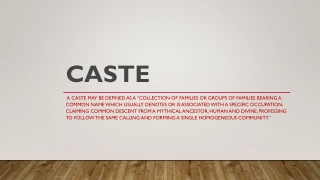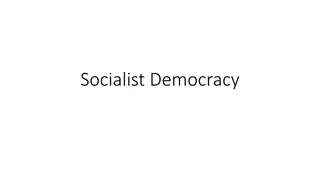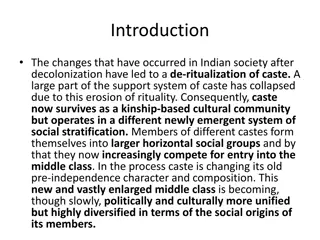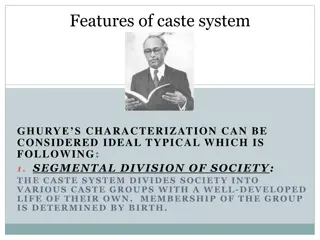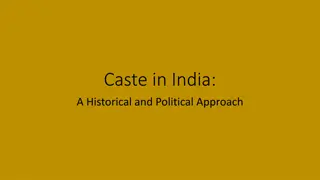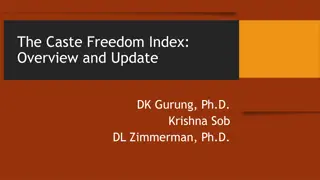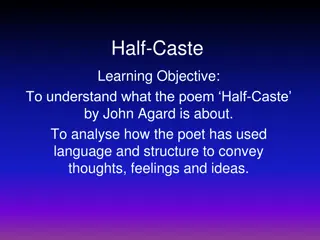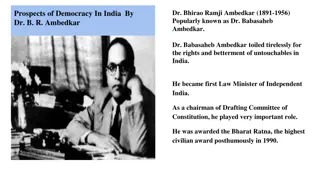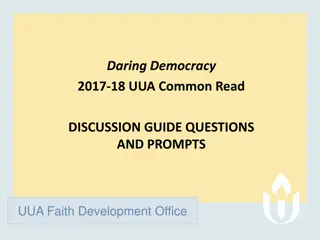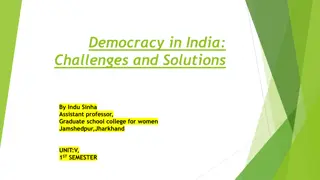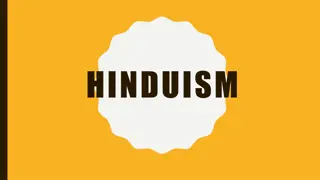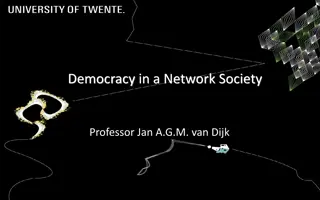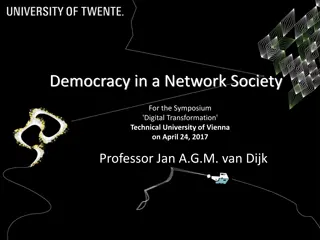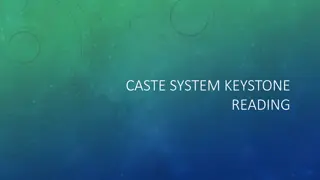Challenges of Caste System and Democracy in Indian Society
Dr. B.R. Ambedkar discusses the prospects of democracy in India, highlighting the challenges posed by the caste system. He emphasizes the need for true societal unity and cooperation to achieve democracy beyond a mere form of government. The Caste system's deep-rooted inequality and lack of shared experiences hinder the ideals of a democratic society in India.
Download Presentation

Please find below an Image/Link to download the presentation.
The content on the website is provided AS IS for your information and personal use only. It may not be sold, licensed, or shared on other websites without obtaining consent from the author. Download presentation by click this link. If you encounter any issues during the download, it is possible that the publisher has removed the file from their server.
E N D
Presentation Transcript
Prospects of Democracy In India By Dr. B. R. Ambedkar Dr. Bhirao Ramji Ambedkar (1891-1956) Popularly known as Dr. Babasaheb Ambedkar. Dr. Babasaheb Ambedkar toiled tirelessly for the rights and betterment of untouchables in India. He became first Law Minister of Independent India. As a chairman of Drafting Committee of Constitution, he played very important role. He was awarded the Bharat Ratna, the highest civilian award posthumously in 1990.
What are the Prospects of Democracy in India? - It is wrongly equated democracy with republic. - Is there democracy in India or is there no democracy in India? Democracy is different from Republic and Parliamentary government. A democracy is more than a form of Government. It is primarily a mode of associated living. The roots of Democracy are to be searched in the social relationship, in terms of associated life between the people who form a society.
What does the word society connote? A society needs community of purpose and desire for welfare, loyalty to public ends and mutuality of sympathy and co-operation. Are these ideals to be found in Indian Society? Indian Society does not consist of individuals. It consists of an innumerable collection of castes which are exclusive in their life and have no common experience to share and have no bond of sympathy. Given this fact, it is not necessary to argue the point. The existence of the Caste System is a standing denial of the existence of those ideals of society and therefore of democracy.
Indian Society is embedded with caste system. In Indian society everything is organised on the basis of caste. Caste system reflects in: Politics, Industry, Commerce, Charity
Special Features of Caste System 1. Caste system is accompanied by Graded Inequality. Caste are not equal in their status. They are standing one above the other. They are standing one above another. They are jealous of one another. It is an ascending scale of hatred and descending scale of contempt. This feature of the Caste system has most pernicious consequences. It destroys willing and helpful co-operation.
2. Difference between Caste And Class 1. Caste and class differ in the fact that in the Class System there is no complete isolation as there is in the Caste System. 1. The higher caste act in one recognised way and the lower caste must respond in one established way. 1. It results into a separation of society, into a privileged and a subject class.
3. Caste is bound to one occupation Society is no doubt stably organized when each individual is doing that for which he has aptitude by nature in such a way as to be useful to others; and that it is the business of society to discover these aptitudes and progressively to train them for social use. But there is in a man an indefinite plurality of capacities and activities which may characterize an individual. A society to be democratic should open a way to use all the capacities of the individual. Stratification is stunting of the growth of the individual and deliberate stunting is a deliberate denial of democracy.
How to put an end to the Caste System? 1. Graded inequality should be removed. The first obstacle lies in the system of graded inequality which is the soul of the Caste System. Where people are divided into two classes, higher and lower, it is easier for the lower to combine to fight the higher, for there is no single lower class. The class consists of lower and lowerer. The lower cannot combine with the lowerer. For the lower is afraid that if he succeeds in raising the lowerer, he may well himself lose the high position given to him and his caste.
2. Caste system disables unity in action therefore discourages common good. Plato has said that the organisation of society depends ultimately upon knowledge of end of existence. Everywhere the mind of the Indians is distracted and misled by false valuations and false perspectives. A disorganized and factional society sets up a number of different models and standard. Under such conditions, it is impossible for individual Indian to reach the consistency of mind on the question of caste.
Can education destroy caste? The answer is Yes as well as No. Yes. No. In fact an educated person belonging to the higher caste is more interested after his education to retain the Caste System than when he was not educated. For education gives him an additional interest in the retention of the Caste System namely by opening additional opportunity of getting a bigger job. If you give education to the lowest strata of Indian Society which is interested in blowing up the Caste System, the Caste System will be blown up.


